 Collaborators from UMMS, University of Liberia and Health Education And Relief Through Teaching (HEARTT) are pictured at UL during a March 2011 visit. From left to right: Donna Gallagher, APRN, co-director of Global Health; Vuyu Golakai, MD, dean, University of Liberia School of Medicine; Dean Terrence R. Flotte, MD; Emmet Dennis, PhD, president, University of Liberia; James Sirleaf, MD, HEARTT; Patricia McQuilkin, MD, director of Pediatric Global Medicine Education and Katherine Luzuriaga, MD, associate provost of Global Health. |
In an effort to substantially improve medical care for war-torn Liberians, UMass Medical School is partnering with the University of Liberia (UL) and Indiana University (IU) to establish health care training programs in the impoverished African nation.
The partnership will create the Center for Excellence in Health and Life Sciences at UL, offering new academic and research programs in biotechnology, public health, nursing and pre-clinical training in medicine and pharmacology. The project, led by UL President Emmet Dennis, is being funded by a $7.2 million grant from the U.S. Agency for International Development (USAID) through Higher Education and Development Inc. (HED).
“This project will make an enormous difference in the lives of struggling Liberians, who have already endured so many years without proper medical care,” said Terence R. Flotte, MD, the Celia and Isaac Haidak Professor in Medicine, dean of the School of Medicine and provost and executive deputy chancellor for UMMS. “Along with University of Liberia President Emmet Dennis and Indiana University, we are taking the essential steps toward setting up quality medical education programs so a new class of doctors and nurses and health care providers will be trained and qualified to help their own communities.”
“HED/USAID support will allow us to make significant progress toward our goal of sustainably rebuilding Liberia’s health care education system,” said Katherine Luzuriaga, MD, professor of medicine and pediatrics and associate provost of global health, who will lead the project for UMMS along with Donna Gallagher, APRN, co-director of Global Health at UMMS and instructor in the Graduate School of Nursing and family medicine & community health. “Over the long-term, we hope that this will result not only in workforce development but also in improved health care for all Liberians.”
At the end of its civil war in 2003, Liberia’s population of more than 3 million had less than one health care worker for every 1,000 people and had only 103 doctors in the entire country. In 2008, the government of Liberia, in conjunction with the International Monetary Fund and other stakeholders, developed a roadmap, called the Liberia Poverty Reduction Strategy, which included expanding access to basic health services.
The new grant will go a long way toward rebuilding Liberia’s capacity for education and training in the health sciences. The grant funds will support degree training for medical and nursing students, who ultimately will become educators. The funding will also provide for new full-time teaching faculty at the university. The John F. Kennedy Memorial Hospital and Tubman National Institute of Medical Arts, both in Liberia, will help to develop nurse leadership and training programs.
"What this grant represents is a culmination of the excellence in the interaction that has occurred between the two American universities and the University of Liberia. This grant is substantial and will go a long way in terms of strengthening our life and health sciences, something that is indispensable to the health of the nation," said Dennis. "It is a model of collaboration between institutions in the developed world and in the developing world. It's not often you find such models and I think other institutions have a lot to learn from the model that has been established from this collaboration."
During the first two years of the project, the objectives in Liberia will include:
- Creating a new two-year, core health and life science undergraduate program that will provide assistance in updating courses for biology majors, and designing a four-year bachelor of science degree program in biotechnology;
- Improving the quality of instruction in biology through faculty and staff development, including advanced degree training for staff, selective hiring and visiting faculty;
- Providing assistance to the pre-clinical science curriculum of the university’s medical and pharmacy colleges, including instructional support from three full-time faculty appointees;
- Improving the quality of science training for the Tubman National Institute of Medical Arts nurses and midwives, through the development of a joint bachelor’s of science in nursing program with the university, and providing faculty with degree training;
- Increasing the number of trained public health specialists in Liberia through development of an undergraduate degree program and advanced degree training for faculty;
- Increasing UL’s access to print and electronic teaching and learning resources for medicine, nursing, midwifery, life sciences and public health;
- Increasing the university’s outreach to non-governmental organizations, clinics and communities and assisting with fundraising activities in support of the health and life sciences; and
- Improving classroom and laboratory instructional equipment and supplies in the Natural Sciences Building in support of enhanced teaching and learning.
Creating a new two-year, core health and life science undergraduate program that will provide assistance in updating courses for biology majors, and designing a four-year bachelor of science degree program in biotechnology; Walter Reed National Military Medical Center in Bethesda, Md., is also donating the contents of its medical library, as well as medical and laboratory equipment, to the University of Liberia, in conjunction with this project.
UMMS began working with Liberia in 2006, when it became involved with UL’s Dogliotti School of Medicine, John F. Kennedy Memorial Hospital and Health Education and Relief Through Teaching in Liberia’s capital, Monrovia. In 2008, UMMS and IU began working together with the University of Liberia to form a multi-disciplinary consortium of educators and health practitioners that led to submission of a proposal to fund the current grant.
Related links on UMassMedNow:
Medical School team rebuilding health care in Liberia
Library projects lending order to chaos in Liberia